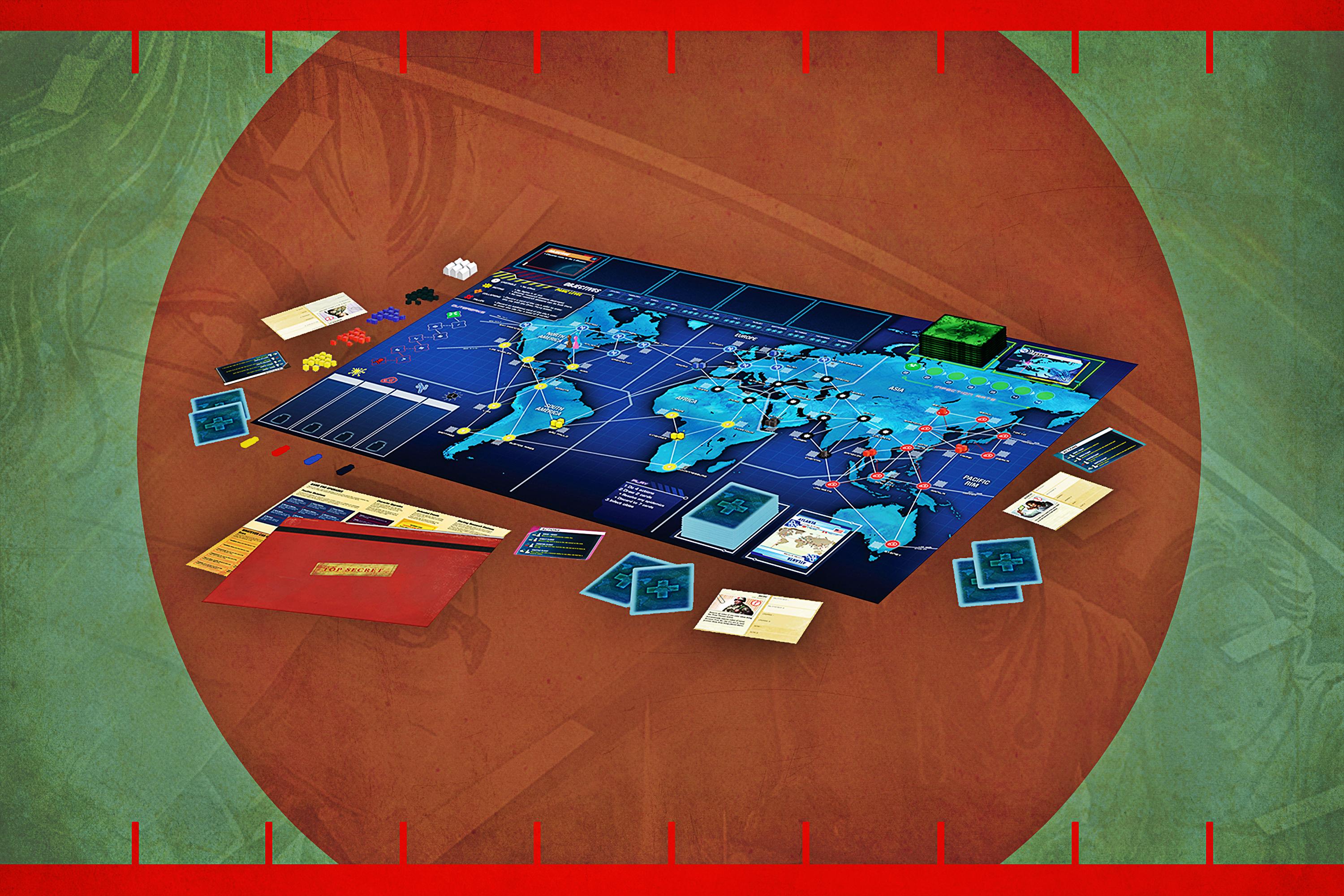Social Distancing Diaries: Playing ‘Pandemic Legacy’ During an Actual Pandemic
A board game about disease may not seem like a natural activity to play during this strange time, but for some, it’s proved to be a welcome distraction
The sports and pop culture calendars have paused. The safest thing that you can do right now is stay inside. And millions of people are looking for creative ways to pass the time. The Ringer is here to help. We’re starting a series called the Social Distancing Diaries, with our staff’s ideas for finding comfort, joy, community, or distraction while doing your part to flatten the curve. In the coming weeks, we’ll be diving into what we’re passionate about and want others to discover—from bidets to buried treasure and everything in between.
I first realized the virus was going to be a problem when it reached the United States. It was mostly contained in Asia and Europe early in the year, but when it landed on America’s West Coast, things escalated quickly. As a CDC scientist, I needed to ramp up my efforts looking for a cure, while hoping the medics in the field could buy me some time.
So I reached for my beer, then drew a couple of cards from the deck … and flipped over an epidemic card. Damnit. Round over.
For the past couple of weeks, my girlfriend and I have been playing Pandemic Legacy, a cooperative board game in which players act as CDC employees who are tasked with stopping four infectious diseases from ravaging the globe. We purchased the game about a week before our real-life state, California, issued a shelter-in-place order due to the coronavirus pandemic. We knew we’d need something to keep us busy indoors—and this game felt like the perfect fit.
The goal of Pandemic Legacy is to save the world from a pandemic, so it couldn’t be more topical; it’s collaborative, so it’s perfect for two hyper-competitive people locked in an apartment together; and we were already familiar with Pandemic, which is the base game that predates Legacy. In Pandemic, two to four players move about a world map trying to contain and cure four diseases. There are characters with different powers, and enough random elements that each game feels unique. Players have to balance curing diseases with stopping the spread of infection. Focus too much on researching a treatment, and the diseases may cover the globe. Worry too much about containment, and time may run out before the diseases can be stopped for good. It’s not easy—though players work together, the game is tough enough that even seasoned veterans won’t always win. And if you screw up too badly, you can always reset the board and try to save the world again.
Legacy builds on all of that by introducing a narrative component. Legacy begins similarly to Pandemic, with players working to cure four diseases—until one mutates and everything gets thrown into flux. In this game, players go through an entire calendar year, with each month taking up a “round” of gameplay. New twists pop up every time the calendar flips, and in between rounds players can add upgrades or see their characters’ abilities diminish. Each domino hits another one, and there is absolutely no resetting. There are literally spoilers—in a board game.
Since its release in 2015, Pandemic Legacy has become regarded as one of the greatest board games ever made. It held Board Game Geek’s no. 1 spot for virtually all of 2016 and 2017, and is currently ranked no. 2. Other sites have heralded it as the “Greatest Board Game of All Time”—or at least “one of the best.” I hesitate to heap the same praise onto it (I mean, how could it be better than, like, chess?), but after spending a few weeks playing it, I can say that it delivers a board-game experience unlike any other I’ve had.
The first time the game instructs you to put a sticker on the board, the stakes still feel low. It’s just a sticker—surely you can peel it off if you mess things up too badly, right? But the first time the game instructs you to rip up a card—not put it aside, but actually physically destroy it—is tough. It went against every single instinct I have, and confirmed that in Pandemic Legacy, there are absolutely no do-overs. This game is made to be played only once, and it won’t let you get around that.
This is how Legacy games work. Unlike the vast majority of board games, Legacy games do not “reset” at the end of a round. Instead, the game delivers a narrative experience that functions a bit like a “Choose Your Own Adventure” book, with decisions that have lasting effects from round to round. The first Legacy board game, Risk Legacy, was invented by game designer Rob Daviau in 2011. But it was Pandemic Legacy, which Daviau also worked on, that helped popularize the format.
“In a brainstorm for Clue we were talking, and I made the comment of, ‘I dunno why they keep inviting these people to dinner, they’re all mass murderers,’” Daviau said in 2016. “And it was this moment where I went ‘Oh yeah!’ The game kind of starts over like the movie Groundhog Day. But the players don’t start over.”
There are now dozens of these games, and they’ve increased in popularity throughout the 2010s. The current no. 1 game on Board Game Geek’s website, Gloomhaven, is another legacy-style game, released in 2017. There’s also a second “season” of Pandemic Legacy, as well as a number of other popular titles like Charterstone and SeaFall—and something called Ultimate Werewolf Legacy.
I’m not familiar with how those other games play, but Pandemic Legacy is hectic. It’s tense. It’s also a ton of fun.
The game includes plenty of aspects that you wouldn’t find in your everyday Candy Land. There is a deck of cards you don’t touch until you’re supposed to. There are dossiers with classified information. There are sealed boxes that have mysterious, game-altering pieces inside. There are stickers that you place everywhere—on the board, on player cards, and on the deck itself. There are scratch-off cards and cards you think are important but will later be instructed to tear into pieces.
There are upgrades—and downgrades. There is funding you’ll get from the government, which—much like in real life—decreases when public health seems more secure (this is the game’s balancing mechanism; win more rounds in a row and you’ll get less funding). There are military bases and roadblocks and quarantines and more characters than you can count—we named our medic after Florence Nightingale and our scientist is a great-great granddaughter of Marie Curie. There are new twists added with each round.
Regular Pandemic is already a fairly complex game, presenting players with plenty of options and strategies each go-around. That’s why it’s played with hands face up, so that the cooperating parties can work together in the hopes of defeating the diseases ravaging the world. Legacy takes those rules, adds a few, and then later adds a ton more. In any one month of gameplay, players could take dozens of different approaches. Maybe it makes sense to work on curing the disease one round, then take a military-first approach in the next. Maybe it makes sense to focus on putting cities under lockdown … or just letting the diseases run rampant as players race to finish some other objective.
Longer-term strategies come into play, too. Multiple times we have delayed winning by a few turns to try to accomplish more things on our board—though those decisions are not without risk. We’ve been burned once or twice by not following a straightforward path to victory. Just remember, whatever you do—whatever mistakes you make—the consequences are permanent.
Feel a bit overwhelmed? This is how I felt when our game got to May. January, February, March, and April weren’t too much trouble. The game threw us some curveballs, but with the right strategies and some old-fashioned luck of the draw, we were able to win all four months with only a few permanent negative effects. Then May happened. One of the diseases mutated again, and we got our asses absolutely handed to us.
Not only did we lose that round, but our board was littered with stickers—bad ones. It felt like we were heading toward disaster, and we still had seven months of the game left. Fortunately when June came, we played a nearly flawless round. Thanks to a couple of key upgrades, the right characters, and a bit of card luck, we even felt comfortable taking a few risks to try to improve our board. We were able to not only win June, but mitigate some looming catastrophes. These impossibly high stakes are what make Pandemic Legacy so fun. Whereas our defeat in May was absolutely demoralizing, our win in June was beyond exhilarating. We still haven’t finished the game yet, but I can’t wait to see what twists and turns await us in the final few months.
You’d think that playing Pandemic during a literal pandemic would only heighten the anxiety. For many, that’d surely be true. But for me it’s just the opposite—it’s a welcome distraction. It helps that the world outside my apartment window does not look like the one on my Pandemic board. COVID-19 has killed more than 30,000 people and infected hundreds of thousands—if not millions—more. I don’t want to give away the specifics of Pandemic Legacy, but I imagine the infections in that game leaving cities looking like London in Children of Men. If the world ever gets to that point, a board game like this will feel out of place. But right now it makes sense.
We still don’t know how many people COVID-19 will end up affecting, but right now we know the best thing most people can do is “flatten the curve” by staying indoors and limiting social contact, therefore buying health officials more time to address the crisis. For some lucky Americans, that means Zoom meetings and Slack chats. For others, it means unemployment and a far scarier future. For everyone, it means staying home. And one way to make that a little more fun, is, well, by playing board games.

